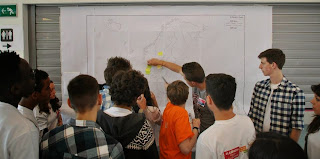Sina Develioglu
From the Kyoto Protocol to the upcoming conference
in Paris this December, governments, non-governmental organisations, people and
also youngsters from all over the world have been working for some time on
making the situation better about climate change. It was very important for the
parties to decide of a universal legal agreement on this matter as soon as
possible, no later than 2015. 4 years have passed since Durban COP17, but still
the problem remains. There has not been any significant change, and by
postponing the important decisions we will endanger our future.
 As the young people of our world, we should feel
equally responsible , as the world leaders are for saving our planet. We should
push our governments to make cuts on their carbon emissions and encourage them
to invest more on renewable energy than fossil fuels or nuclear energy. Nearly
everything depends on the energetic choices being made today. Creating false or
temporary solutions will only slow us down. In order to really make a
difference, all of the countries in the world must act as one team and reach a
final agreement at the end of year. We really don’t have much time.
As the young people of our world, we should feel
equally responsible , as the world leaders are for saving our planet. We should
push our governments to make cuts on their carbon emissions and encourage them
to invest more on renewable energy than fossil fuels or nuclear energy. Nearly
everything depends on the energetic choices being made today. Creating false or
temporary solutions will only slow us down. In order to really make a
difference, all of the countries in the world must act as one team and reach a
final agreement at the end of year. We really don’t have much time.
Although it looks bad, I personally think that there
are still things we can do but we have to act fast. People who care about the
planet unfortunately rely on politicians (decision makers) and if they are not
willing to cooperate with us, then everything we have done (recycling, protests
against nuclear energy, workshops, conferences etc) would not matter anymore.
To save Earth we need everyone. To save Earth, we need to take
responsibilities. To save Earth we need to act. To save Earth, to have a future
on Earth we need to become the decision makers itself to take the decisions
some leaders nowadays won’t take. A man has a lot of potentials, both good and
bad. All we have to do is to believe that all of us have the power to do well
and to reach others.
Think big. Act big.
I would like to ends my words with the main question
of our youth conference in Brussels:
If not us who and if not now when?






